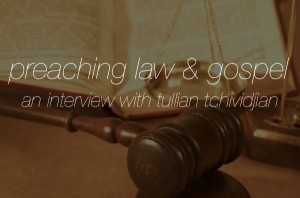Tullian Tchividjian's Blog, page 4
July 14, 2014
Monday Morning Music
This new track by Mr. Probz will hopefully get your Monday off to a groovy start. Enjoy…
“And it feels like I’m drowning, pulling against the stream…”
July 11, 2014
The Grace Of A Great: A Farewell To LeBron James
 What is it about LeBron James that generates so much raw emotion and passion among his fans? Is it because of his two NBA championships, four NBA Most Valuable Player Awards, two NBA Finals MVP Awards, two Olympic gold medals, an NBA scoring title, and the NBA Rookie of the Year Award? His pure athletic greatness could be the reason he has so many die-hard followers. But for me, as of yesterday, he’s come to represent something much more.
What is it about LeBron James that generates so much raw emotion and passion among his fans? Is it because of his two NBA championships, four NBA Most Valuable Player Awards, two NBA Finals MVP Awards, two Olympic gold medals, an NBA scoring title, and the NBA Rookie of the Year Award? His pure athletic greatness could be the reason he has so many die-hard followers. But for me, as of yesterday, he’s come to represent something much more.
It wasn’t until he decided yesterday to return to his hometown and play once again for the team that drafted him back in 2003–the Cleveland Cavaliers–that I finally realized what it was about LeBron that has entranced me for the last four years as he played his guts out for my beloved Miami Heat.
I was devastated by the news – following closely in real-time for the final decision. I was scared to read his piece in Sports Illustrated on Friday morning. I didn’t want to believe that he was actually leaving Miami. But as I read his letter, two things happened: my fears became reality (he was, in fact, leaving Miami) but secondly, I realized that what attracts me to LeBron is something more than just his basketball prowess. It’s his gracefulness.
Hang in there with me on this one. LeBron was with the Cleveland Cavaliers from 2003-2010 – Ohio was his home and his devotion was clear.
Before anyone ever cared where I would play basketball, I was a kid from Northeast Ohio. It’s where I walked. It’s where I ran. It’s where I cried. It’s where I bled. It holds a special place in my heart.
After his long tenure, LeBron made the decision to leave his home and the Cleveland Cavaliers to move to Miami on July 8, 2010. He had brought the Cavalier organization from the bottom of the NBA to the top…leading them to their first ever NBA Finals in 2007. He brought basketball respectability to Cleveland. When he left, he didn’t leave because he was demanding a trade or pouting because he didn’t have a better supporting cast. He left as a free-agent…meaning, he fulfilled his contract with the Cavs and was now free to sign with any team he chose. He had fulfilled his responsibilities in Cleveland and was now relocating. He was offered a “job” in Miami and he took it because it gave him the opportunity to play with two of his best friends, Dwyane Wade and Chris Bosh, and it gave him the best chance to win multiple championships…which, in that business, is the goal.
While I was thrilled with the decision and what this meant for my Miami Heat, I watched as LeBron James instantly fell from grace in the eyes of his once-loyal following. His decision to leave the Cleveland Cavaliers drew immense criticism. He was villainized by sports analysts, ostracized by his fans, and emotionally exiled from the place he once called home. He was no longer their hope and their hero. Cavalier fans burned his jersey in the streets. The owner, Dan Gilbert, wrote a piece on LeBron that was so slanderous and scathing I couldn’t believe what I was reading when I first saw it.
But, for the next four years, LeBron would prove to be my hero as he led the Miami Heat to four straight NBA Finals appearances and back-to-back championships. He was a super star. He had passion and courage and ridiculous talent. Like I said, however, there was something else about him that always resonated with me. And I couldn’t quite put my finger on it until yesterday…the day he decided to leave my team and go back to Cleveland.
This is where grace comes in.
In 2010, Cleveland had disowned and betrayed LeBron – from his once-beloved fans to his former teammates to the owner to the city itself – and he lived with this in his heart for four years. But, despite the fact that he wasn’t welcome there (he was, in fact, booed every time he went back there to play with the Heat) nor had he ever achieved championship status there, LeBron forgave them all before they had even asked. LeBron’s love for “his people” compelled him to leave a city that loved him (Miami) for a city that disowned him (Cleveland):
To make the move I needed the support of my wife and my mom, who can be very tough. The letter from Dan Gilbert, the booing of the Cleveland fans, the jerseys being burned — seeing all that was hard for them. My emotions were more mixed. It was easy to say, “OK, I don’t want to deal with these people ever again.” But then you think about the other side. What if I were a kid who looked up to an athlete, and that athlete made me want to do better in my own life, and then he left? How would I react? I’ve met with Dan, face-to-face, man-to-man. We’ve talked it out. Everybody makes mistakes. I’ve made mistakes as well. Who am I to hold a grudge?
LeBron’s decision to return to a city he loves with a desire to bless the same people who cursed and ridiculed him four years ago is a remarkable picture of grace.
Cleveland, not LeBron, is the fickle prodigal son. And LeBron, not Cleveland, is the devoted father. He welcomes Cleveland back with open arms and never once asks them to take back every terrible and mean thing they said and did. By returning to Cleveland, he shows all of us how to love and forgive the ill-deserving.
Yes, LeBron, you have certainly shown me that you are much more than a high-priced basketball diva. I will miss you in Miami but am happy to welcome you into the grace club…for it is here that you will find peace and play the game of basketball with a much lighter heart and more passion than ever.
July 10, 2014
You’re Not Okay…And That’s Okay
 The gospel liberates us to be okay with not being okay. We know we’re not okay—though we try very hard to convince ourselves and other people that we’re basically fine. But the gospel tells us, “Relax, it is finished. The pressure’s off.”
The gospel liberates us to be okay with not being okay. We know we’re not okay—though we try very hard to convince ourselves and other people that we’re basically fine. But the gospel tells us, “Relax, it is finished. The pressure’s off.”
Because of the gospel, we have nothing to prove or protect. We can stop pretending. We can take off our masks and be real. The gospel frees us from trying to impress people, appease people, measure up for people, or prove ourselves to people. The gospel frees us from the burden of trying to control what other people think about us. It frees us from the miserable, unquenchable pursuit to make something of ourselves by using others.
The gospel frees us from what one writer calls “the law of capability”—the law, he says, “that judges us wanting if we are not capable, if we cannot handle it all, if we are not competent to balance our diverse commitments without a slip.” The gospel grants us the strength to admit we’re weak and needy and restless—knowing that Christ’s finished work has proven to be all the strength and fulfillment and peace we could ever want, and more. Since Jesus is our strength, our weaknesses don’t threaten our sense of worth and value. Now we’re free to admit our wrongs and weaknesses without feeling as if our flesh is being ripped off our bones.
The gospel frees us from the urge to self-gain, to push ourselves forward for our own purposes and agenda and self-esteem. When you understand that your significance, security, and identity are all anchored in Christ, you don’t have to win—you’re free to lose. And nothing in this broken world can beat a person who isn’t afraid to lose! You’ll be free to say crazy, risky, counterintuitive stuff like, “To live is Christ and to die is gain”!
Real, pure, unadulterated freedom happens when the resources of the gospel smash any sense of need to secure for myself anything beyond what Christ has already secured for me.
July 7, 2014
Monday Morning Music
Here’s a deep and dreamy groove from Route 94 to get your week off to a smiley start.
Happy Music Monday, my friends…
“My love…”
July 5, 2014
Is Your Life Defined By A Ladder Or A Cross?
 In Quentin Tarantino’s Pulp Fiction, Mia Wallace (Uma Thurman) tells Vincent Vega (John Travolta) that she needs to find out what kind of person he is before she’ll go to dinner with him. Here’s what she says:
In Quentin Tarantino’s Pulp Fiction, Mia Wallace (Uma Thurman) tells Vincent Vega (John Travolta) that she needs to find out what kind of person he is before she’ll go to dinner with him. Here’s what she says:
My theory is that when it comes to important subjects, there’s only two ways a person can answer. For instance, there’s two kinds of people in this world, Elvis people and Beatles people. Now Beatles people can like Elvis. And Elvis people can like the Beatles. But nobody likes them both equally. Somewhere you have to make a choice. And that choice tells me who you are.
There are other important things in life that can tell us what kind of person you are: chunky peanut butter, or smooth? Regular cola, or diet? It seems to me that the same is true when it comes to reading the Bible. Do you read the Bible as a helpful tool in your climb up toward moral betterment or as the story of God coming down to broken, sinful people?
In a very real way, our lives are defined by how we answer that question. Specifically, our lives are defined either by a cross or by a ladder. The ladder symbolizes our ascension—our effort to “go up.” The cross symbolizes God’s descension—his coming down.
There is no better story in the Old Testament, or perhaps the whole Bible, for depicting the difference between the ladder-defined life and the cross-defined life than that of the Tower of Babel.
In Genesis 11:4, the people make a decision. “Come, let us build ourselves a city,” they said, “with a tower that reaches to the heavens, so that we may make a name for ourselves.” This is humanity in a nutshell. We want desperately to be known, appreciated, lauded, and extolled. We want to secure our own meaning, significance, and worth. We give our all to these objectives.
But then something funny happens.
After the people go to work to build this tower that reaches “to the heavens,” v.5 says, “But the Lord came down to see the city and the tower the people were building.” I find this verse to be a great and sobering picture of our futile attempts to “make a name for ourselves,” to do something great in our own power. The momentous achievement that the builders are so proud of is so small and insignificant to God that he has to “come down from heaven” to even see what they’re up to. All their efforts, all their hard work, have resulted in a tower that not only doesn’t reach the heavens, but that can’t even be seen from them!
None of our best attempts and none of our self-righteous strivings (and make no mistake, that is exactly what they are) can get us up to God.
We are like the tower-builders: addicted to a ladder-defined life. We think that a life of ladder-climbing is a life of freedom: free to move at our own pace, up or down depending on our decisions, responsible for our own progress. We climb our ladders for the same reasons that the people of the world built their tower: to make a name for ourselves, to ensure our own legacy, to secure our own value. We love to imagine that we’re on a higher rung than someone else, a better father than someone else, a more accomplished follower of Christ than someone else. But ladder-climbing actually and inevitably leads to slavery. Paul Zahl, in his amazing little book Who Will Deliver Us?, describes the ladder-defined life like this:
If I can do enough of the right things, I will have established my worth. My identity is the sum of my achievements. Hence, if I can satisfy the boss, meet the needs of my spouse and children, and still do justice to my inner aspirations, then I will have proven my worth…conversely…if I do not perform, I will be judged unworthy. To myself I will cease to exist.
The life of slavery happens when we try to “do it ourselves.” We become imprisoned by our failures (often real, sometimes perceived) and to ourselves, we cease to exist. This isn’t freedom, it’s bondage.
But there is good news: our towers of Babel don’t remain standing.
God loves us too much to leave us in the hell of unhappiness that comes from trying to do his job. Into the slavish misery of our ladder-defined lives, God condescends.
His first act is an act of judgment. He scatters them—he dis-organizes them, literally. God takes away their faith in themselves, the very misplaced faith that enslaves them. When everyone in the world spoke the same language, God came down in judgment, breaking the world apart. But at just the right time, he came down again, this time to reconcile that sinful world to himself. He replaces our ladder with his cross. His final descent was to save us, and to set us free.
So how do you read the Bible? Is the Bible a manual for living the ladder-defined life? Or is it the announcement of the one who came down and hung on a cross in order to rescue us from our efforts to make it on our own?
God is not at the top of a ladder shouting, “Climb.” He is at the bottom on a cross whispering, “It is finished.”
July 2, 2014
Christ Is Deeper Still
 Normally, the outdoorsy image of choice for spiritual growth is mountain climbing. You know how it is: new Christian at the bottom of the mountain, mature Christian near the top. I want to take you a different way…so let’s go spelunking!
Normally, the outdoorsy image of choice for spiritual growth is mountain climbing. You know how it is: new Christian at the bottom of the mountain, mature Christian near the top. I want to take you a different way…so let’s go spelunking!
Spelunking is cave exploration, and it’s my suggesting for another way to think about spiritual growth. Instead of thinking of growth in Christ as a climb up a mountain, let’s think of it as a trip down into a cave. Where a mountain climbing expedition gets higher and higher (and as Christians we might be tempted to think, better and better–however we define “better”), a caving exploration goes deeper and deeper, exploring the undiscovered depths. Spiritual growth is not about climbing a mountain, getting better, and therefore needing Christ less and less. Spiritual growth is about discovering more and bigger caverns of need into which more and more of Christ’s grace can flow. We think spiritual growth is about height, when spiritual growth is about width. We think it’s about the heights we’ve attained when, in truth, it’s about the breadth of our need.
True growth as a Christian involves recognizing that there is always another cavern to explore. There’s always another crevasse of self-centeredness, or stalactite of jealousy. The light of Jesus shines into deeper and darker corners and proclaims, “Yes, I can save this too.” True growth as a Christian means realizing that all the climbing we need to do is down into the depths.
We hear, “For God so loved the world that we gave his one and only son that whoever believes in him may not perish but have eternal life,” and we think “Got it! Simple! What’s the next thing? What’s the deeper teaching? How do I start climbing the mountain of a life following Jesus?” The Bible answers, “Like newborn infants, long for the pure, spiritual milk, so that by it you may grow into salvation.” It is this milk, the simplicity of the Gospel message, that grows us into a deeper awareness of our desperation and therefore a deeper awareness of our deliverance. That’s Christian growth.
“There is no pit so deep, but Christ is deeper Still.”
June 30, 2014
Monday Morning Music
Matt Lange’s track “Staccato” (on Anjunabeats Vol. 11) blew me away the first time I heard it a couple weeks ago while I was driving. I’m not even sure how to describe it. It’s like a wordless dream put to music.
And to celebrate Matt’s release of his new EP on Anjunadeep TODAY, here is his whole guest mix on Above & Beyond’s “Group Therapy” this past Friday night. Thirty minutes of some deep stuff.
Happy Monday, friends…
June 27, 2014
Preaching Law And Gospel
 A couple weeks ago I had the privilege of being interviewed by RJ Grunewald (youth minister at Faith Lutheran Church) on preaching law and gospel. I hope you enjoy the conversation as much as I did.
A couple weeks ago I had the privilege of being interviewed by RJ Grunewald (youth minister at Faith Lutheran Church) on preaching law and gospel. I hope you enjoy the conversation as much as I did.
You can find it here.
June 25, 2014
“To See The Law By Christ Fulfilled…”
 When Daniel worships his own God, Darius doesn’t change the rules for him. This seems ridiculous. The king loves Daniel, he doesn’t want Daniel to die, and he’s the king! Why doesn’t he just change the rules? Well, it doesn’t work that way. The law is inflexible: not one “jot or tittle” (Matt 5:18) will be changed. There is no wiggle room. This is terrible news for us sinners.
When Daniel worships his own God, Darius doesn’t change the rules for him. This seems ridiculous. The king loves Daniel, he doesn’t want Daniel to die, and he’s the king! Why doesn’t he just change the rules? Well, it doesn’t work that way. The law is inflexible: not one “jot or tittle” (Matt 5:18) will be changed. There is no wiggle room. This is terrible news for us sinners.
One of the great misconceptions about Christianity is that grace involves setting aside, circumventing, or ignoring the rules (the law). At the very least, we think of Jesus’ good work as lowering the bar of the law. He takes all of God’s laws and turns them into “Do your best to love God and love each other. Try. Peace out, man.”
But this is a profoundly flawed view. In the Sermon on the Mount, for instance, Jesus raises the bar of the law. Or, more accurately, showing how high the bar of the law has always been. From the beginning, God has always demanded perfection. Uninterrupted, inside-out, outside-in perfection. “Be perfect as your Father in heaven is perfect.” Like grace, the law has no “buts.”
When we sin, God does not set the law aside. If he did, we could never have any assurance, or peace. What is he going to do next time? What if we do something worse? What if we keep doing the thing that we did? Is he going to keep setting aside the law? This is not grace, and it doesn’t lead to peace. It leads, rather, to fear. When we count on the rules being relaxed for us, we’re hoping on something in which we have no confidence.
The Good News is that God does better than setting aside the law. He closes lions’ mouths.
Jesus did not come to relax the law; he came to FULFILL the law! Or, to put it another way: we are not saved apart from the law; rather we are saved by Jesus who perfectly kept the law on our behalf. So, when we find ourselves called onto the carpet of life, and justly accused of breaking a law, we don’t have to hope that the law gets ignored. We don’t have to hope that the law gets changed. We don’t have to hope that the law gets circumvented. We can know that the law has been placed on the shoulders of Another, and that he has been cast to the lions in our place. Daniel awoke the next morning without a scratch; saved by God. Jesus does one better: he was raised, victorious over sin and death — and not just for himself, but for us.
The law demands perfection–no “ifs, ands or buts.” The gospel is the good news announcing that Jesus has delivered perfection with no strings attached–no “ifs, ands, or buts.”
June 23, 2014
Monday Morning Music
This brand new track by Swiss born Italian Producer/DJ, EDX (Maurizio Colella), is the perfect summer groove. Sweet, soothing, chill…beautifully crafted.
Happy Monday everybody…
“Take my love, inside your lungs, so you can be breathin’ underwater…”
Tullian Tchividjian's Blog
- Tullian Tchividjian's profile
- 142 followers



